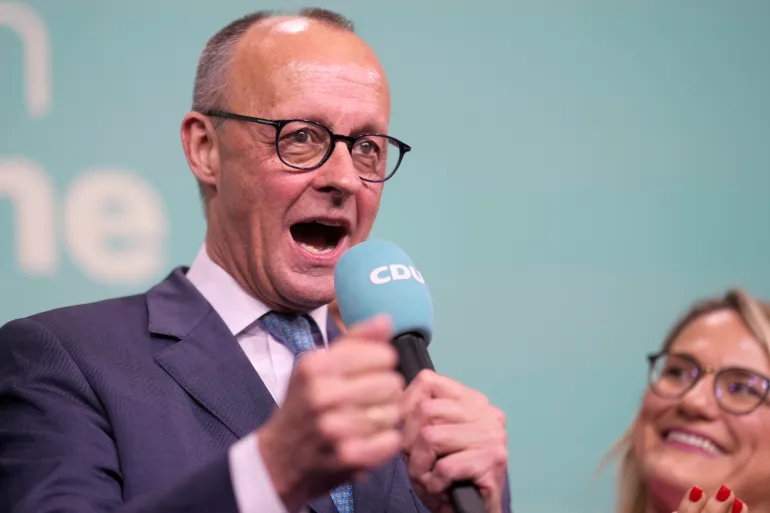Germany’s conservative leader, Friedrich Merz, has vowed to prioritize European independence from the United States after his centre-right Christian Democratic Union-Christian Social Union (CDU/CSU) alliance emerged victorious in the latest parliamentary elections. The election, held amid growing concerns over former U.S. President Donald Trump’s commitment to Europe’s security, saw a dramatic shift in the political landscape as the hard-right Alternative for Germany (AfD) doubled its vote share from 2021.
Merz, addressing a televised panel on Sunday, expressed grave concerns about the future of NATO and underscored the urgent need for Europe to develop its own defense capabilities. “I never thought I would have to say something like this on a TV programme,” Merz remarked, referencing Trump’s recent statements questioning U.S. support for Europe. “My absolute priority is to ensure that Europe can defend itself without relying on Washington.”
His comments come as Trump-backed figures in the U.S. continue to push for a reduction in American involvement in European affairs. Merz warned that the North Atlantic Treaty Organization (NATO) might not remain intact in its current form by the alliance’s next summit in June, raising fears about Europe’s vulnerability if the U.S. further distances itself.
Preliminary results from Sunday’s election revealed a striking increase in support for the far-right Alternative for Germany (AfD), which captured 20.8% of the vote and secured 152 seats in the Bundestag. This result marks the party’s strongest performance in a national election to date. Despite its gains, Merz categorically ruled out forming a coalition with the AfD, citing the party’s controversial platform and growing external interference.
“The interventions from Washington were no less dramatic and impertinent than those from Moscow,” Merz said, criticizing tech billionaire Elon Musk for his public support of the AfD during the campaign. Musk, a known ally of Trump, amplified AfD’s messaging on social media, further fueling tensions in an already polarized election.
Outgoing Chancellor Olaf Scholz’s Social Democratic Party (SPD) suffered a historic defeat, earning just 120 seats—its worst result since World War II. The pro-business Free Democratic Party (FDP), a key member of the outgoing three-party coalition, failed to cross the 5% threshold required to secure representation in the Bundestag, further complicating future coalition talks.
With the CDU/CSU alliance winning 208 seats and securing 28.6% of the vote, Merz faces the challenging task of building a governing majority. The exclusion of the AfD narrows his options, forcing negotiations with the SPD or potentially multiple parties. Merz acknowledged the difficulty ahead but remained resolute. “If we have one partner, it will be easier; if we need two partners, it will be harder,” he said. “But either way, Germany needs a functioning government quickly. The world will not wait for us.”
The Greens, who secured 85 seats, and the leftist Die Linke, with 64 seats, may play a pivotal role in shaping the next government. Meanwhile, left-wing populist party Bündnis Sahra Wagenknecht (BSW) managed to capture just one seat.
The election results come at a crucial time for Germany and the broader European Union. With ongoing concerns about the war in Ukraine and the future of transatlantic relations, Merz’s push for European self-reliance signals a significant policy shift. Trump’s praise for the AfD’s performance further amplifies concerns that U.S. support for Europe may continue to wane if he returns to power.
AfD leader Alice Weidel celebrated her party’s gains, warning the established parties against ignoring their growing influence. “Our hand remains outstretched to form a government,” Weidel told supporters. She further claimed that forming a coalition excluding the AfD would be akin to “electoral fraud” and predicted the party would eventually lead Germany.
As coalition negotiations unfold, the political direction of Germany—the EU’s largest economy—remains uncertain. However, Merz’s emphasis on fortifying European autonomy could reshape the continent’s strategic posture for years to come.
For the latest updates on global politics, technology, and business, sign up for our newsletter at www.innovationtimes and stay ahead with expert insights and breaking news.



